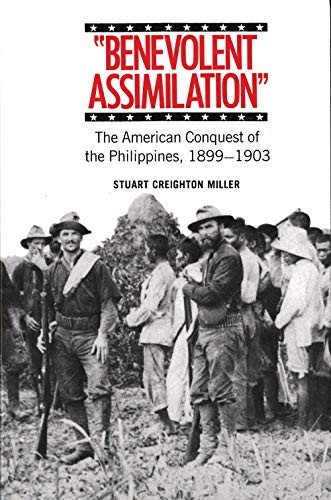Benevolent Assimilation
The American Conquest of the Philippines, 1899-1903
Stuart Creighton Miller
BOOK REVIEW

To understand the intricate web of power, politics, and culture that spanned the globe at the turn of the 20th century, one must dive into Stuart Creighton Miller's Benevolent Assimilation: The American Conquest of the Philippines, 1899-1903. This work is not merely a historical account; it is a riveting narrative that challenges the romanticized notion of American imperialism. 💥
At the heart of Miller's exploration lies the juxtaposition of benevolence and domination. The title itself is a treacherous play on words, promising goodwill while concealing the harsh realities of military might. He vividly recounts the annexation that followed the Spanish-American War, shedding light on the power struggles that laid waste to the dreams of independence the Filipino people held dear. A cocktail of cultural arrogance and military strength brewed a storm that forever changed the trajectory of the islands and their inhabitants. Miller's meticulous attention to detail, backed by extensive research, thrusts readers into the gritty realities of conflict and conquest. 🗡
Miller's narrative is not only about battles and political maneuvers; it is an exploration of human consequences. His ability to evoke empathy for the Filipino struggle-caught in the crosshairs of a supposed "civilizing mission"-is palpable. As you delve into the pages, it is impossible to view the American Forces as mere liberators. Instead, you witness a clash of cultures where the ideals of democracy and freedom are smeared by blood and tyranny. The author powerfully illustrates that this was a period where America stood at a moral crossroads, one that reverberates through contemporary dialogues on imperialism and interventionism.
Critics have praised Benevolent Assimilation for its exhaustive research and gripping prose, yet some argue that Miller oscillates between being an objective historian and an impassioned advocate for the Filipinos. This duality, while adding depth, can also lead to heated debates. Some readers recoil at Miller's portrayal of American troops, while others applaud his candor. Isn't it fascinating how historical retellings can evoke such a spectrum of emotions? 🧐
Moreover, the historical context is significant. Emerging from the shadows of colonial powers, the United States assumed the role of a global player, seeking to expand its influence. In a post-colonial world, Miller's insights are crucial for understanding America's complicated legacy. The narrative compels you to reflect on how imperialism shapes national identities-not just for the conquered, but equally for the conquerors. As you peel back the layers of Miller's arguments, the reader's mind races to contemporary parallels, as modern imperialist policies frequently echo old strategies.
What also stands out is how Miller seamlessly interweaves personal accounts with broader historical events, compelling you to feel the fear and resilience of the Filipino spirit. Amidst the chaos of war emerges a tapestry of voices-individuals fighting for their homes, their culture, and their identities. The author's decision to give space to these voices serves to amplify the human experience, making it relatable even decades later.
Miller's impact does not stop there; scholars and activists have long cited Benevolent Assimilation as a critical text in understanding the ramifications of imperialism in the 21st century. The book has ignited discussions in academic circles and among policymakers, drawing parallels to recent military interventions and foreign policies that echo this historical narrative. 📚
In reading this formidable work, you are invited into a dialogue that not only examines the past but also implores you to scrutinize the present. The themes of power, identity, and morality are evergreen and warrant a second, third, or even fourth look. As history unfolds and societies evolve, Miller's insights remind us that understanding our past is crucial in forging a more equitable future.
Ultimately, Benevolent Assimilation: The American Conquest of the Philippines, 1899-1903 is not simply a chronicle of conquest; it is a profound study of humanity caught in the throes of ambition and resistance. As the pages turn, you are left questioning-for what does benevolence truly mean in the face of overwhelming oppression? ⚖️✨️ Embrace this challenge and dive into the complexities that Miller so vividly unravels.
📖 Benevolent Assimilation: The American Conquest of the Philippines, 1899-1903
✍ by Stuart Creighton Miller
🧾 362 pages
1984
#benevolent #assimilation #american #conquest #philippines #1899 #1903 #stuart #creighton #miller #StuartCreightonMiller